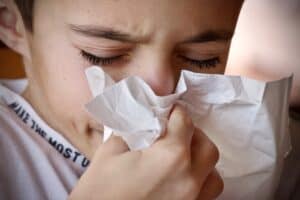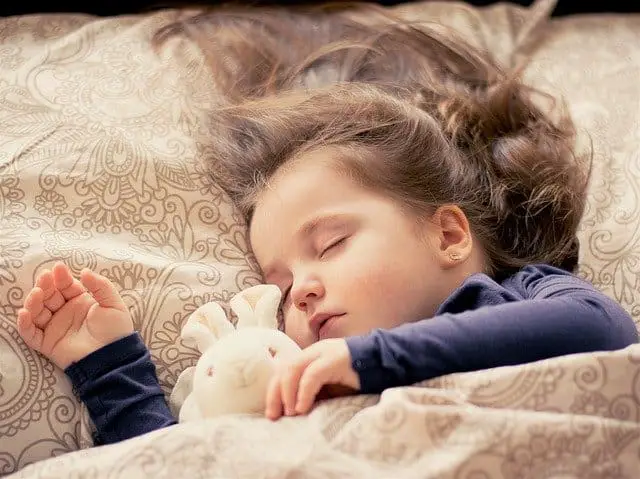Babies are delicate thus why they ought to be given the best care available. When it comes to coughing in babies, there are many common medications such as using cough syrups. Unfortunately, these options are not considered safe for a baby. Offering liquids, using steam, and adjusting a baby’s sleeping position are the two most recommended home remedies for dealing with coughs in babies. Liquids are recommended because coughs tend to be persistent on dry throats. Babies under six months should be hydrated using formula or breast milk while for older ones, water or broth can be used. When it comes to changing a baby’s sleep position, there is the best sleeping position for coughing baby.
Best Sleeping Position for Coughing Baby
A baby’s stuffy nose, fever, and coughing can make you and your baby night restless. Something that would be miserable for the whole family.
Thankfully there is a way you can minimize this, if not make it disappear regardless of whether your small one is coughing from acid reflux or mucus.
This is by changing the baby’s sleeping position, either on his crib, your baby, or whenever the baby sleeps either at night or during the day.
The best sleeping position for babies is on their back. It’s not recommended for babies to sleep on the side or front. This doesn’t mean that a baby cannot sleep, but if they sleep on their front or side, the risk of sudden infant death syndrome (SIDS) increases especially in babies. For toddlers, it is safer.
Related post: How to Get a baby to Take Medicine Without Spitting Out
While the baby is sleeping on his back, elevate his head by placing a pillow under their neck and head. The end of the mattress where the baby rests his head can be elevated using a rolled-up towel s well.
If your baby is below 2 years, do not use a soft material to elevate his or her head. This is because such material, a wedge, for example, poses a suffocation risk. Use solid things such as wooden wedges and make sure the bed or clot is stable.
The key is keeping your baby’s head elevated while sleeping because lying flat makes coughing worse. Such a position reduces coughing, especially at night.
If the mucus is the main problem during such times, elevating or keeping your baby’s head up solves the issues. If acid reflux is the problem, try babywearing.

At what Point Should a Doctor be Called
Over-the-counter medications for babies are not recommended. A baby should be examined before putting him or her under medication. No matter the cause of the cough, certain signs call for medical assistance. These symptoms include:
- Shortness of breath
- Coughs with blood
- Prolonged coughing (coughing for more than 2 weeks)
- Troubled breathing
- Noisy breathing such as wheezing, whistling, or cough with a whooping sound
- Child has difficulty swallowing
These are some of the signs that show a cough is severe a pediatric or a baby’s doctor should be contacted. Also, if your child has unusual behavior(s), it would be wise to contact a medical practitioner.
Causes of Coughing in Babies
Throat or lungs irritation is the common cause of coughing in both children and adults. For babies, some of the common reasons are:
- Allergies – Babies develop seasonal allergies at the age of 3 – 5 years. This does not mean babies cannot react to an allergen, especially indoor ones such as dust. When babies are exposed to such allergens, they tend to cough until they are no longer affecting them.
- Asthma – Apart from rapid breathing, coughing is also a sign of asthma. Coughing related to asthma is commonly accompanied by wheezing.
- Reflux – this is the backward flow of acid and other stomach contents in a baby. Some babies outgrow it while others require medical attention to get better.
- Pneumonia – one of the signs of pneumonia is coughing. If your baby has fever, diarrhea, and vomits on top of coughing, it might be possible he or she has pneumonia.
Coughing might also be caused by respiratory viruses such as cold and flu.
Tips to Make Your Baby Sleep Better With a Cold
- Making a nightcap – Give your baby a warm drink prior to going to bed. For the best results, offer them a mixture of warm water, lemon, and honey. While doing so, remember that honey is recommended for children above the age of 1.
- Propping them – babies tend to cough at night. To help in reducing this, prop them well and for older ones, you can use rolled-up towels or extra pillows. For babies under 2 years, consult your child’s doctor before propping them.
- Use a humidifier – By using a humidifier, the air that your baby breaths in is moistened. Breathing in moist air reduces coughing in babies.
- Take care of night fever – talk to your pediatrician to give you an antipyretic medicine to ease aches and prevent fever at night.
Check out more home remedies for colds in babies.
Conclusion
Even if coughing can be frustrating to everyone in the family, give your baby lots of love. Hugging her, holding them close, and showing them affection not only makes both of you feel better but also quickens their recovery.
If coughing persists (goes for more than 14 days) or other signs such as fever and diarrhea start to show up, opt to contact the child’s doctor. The same applies to coughs that sound like “whooping” or cough with wheezing regardless of it being a dry or wet cough.







